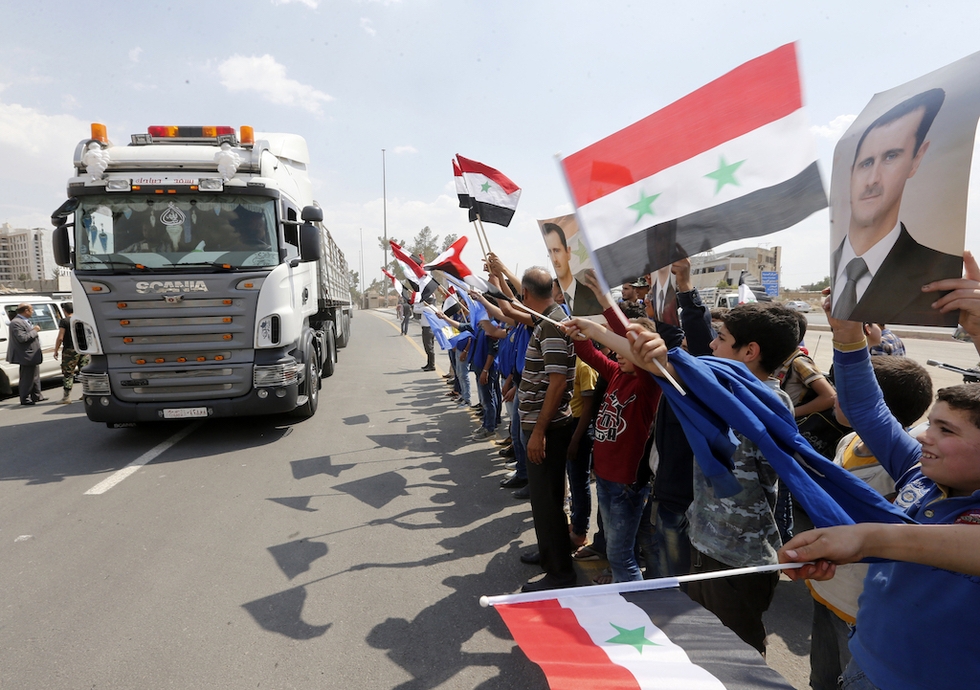Syria's Assad threatens force against US-backed Kurds

Syrian President Bashar al-Assad has warned US-backed Kurdish forces he would not hesitate to use force to retake the third of the country they control.
He told Russia Today in an interview aired on Thursday that he favoured negotiations with the Syrian Democratic Forces (SDF), a Kurdish-led outfit supported by the US-led coalition.
"If not, we're going to resort to liberate these areas by force," Assad said.
He added that direct conflict between his ally Russia and the United States in Syria had only been narrowly avoided.
"We were close to having direct conflict between the Russian forces and the American forces."
Fighting erupted at the end of April between government forces and SDF fighters in the oil-rich Deir Ezzor province, formerly held by the Islamic State (IS) group, driven out of the overwhelming majority of the region under the blow of multiple offensives.
The province had been the subject of a race between the Russian-backed Assad government forces and the SDF, each trying to outpace its rival.
Today, Assad controls the city of Deir Ezzor, capital of the province of the same name, but also the entire west bank of the Euphrates, while the SDF are stationed on the eastern shore.
Manbij deal
In northern Syria, Turkish and US officials last week agreed on a "roadmap" for further cooperation to ensure the security of a Kurdish-held city which became a major headache between the NATO allies, according to a joint statement.
The northern city of Manbij is held by the People's Protection Units (YPG) pro-Kurdish militia, a group which Ankara says is the "terrorist" offshoot of Kurdish hardliners in Turkey, and which is part of the SDF.
The US has a military presence in Manbij and has provided military support to the YPG in the fight against IS, causing anger among Turkish officials.
After Turkey launched a cross-border operation against the YPG in the western enclave of Afrin in January, President Recep Tayyip Erdogan threatened to take the offensive to Manbij. The prospect raised fears of a confrontation between Turkish and American troops.
The offensive also caused tension between the allies because Washington urged Turkey to show "restraint" and said it could harm the fight against IS.
US officials were in Ankara on Friday as part of a working group on Syria. After talks with Turkish counterparts, the statement was issued by the Turkish foreign ministry and the US embassy in Ankara.
"The two sides outlined the main contours of a roadmap for their further cooperation in ensuring security and stability in Manbij," the statement said, giving no further detail.
The working group was established to try to resolve the Manbij issue and coordinate US-Turkey efforts in Syria after Turkish Foreign Minister Mevlut Cavusoglu and then US Secretary of State Rex Tillerson met in February.
Pentagon warning
The Pentagon on Thursday warned Assad not to carry out an offensive agains Kurdish-led forces backed by the United States that control the country's north-east.
"Any interested party in Syria should understand that attacking US Forces or our coalition partners will be a bad policy," Lieutenant General Kenneth McKenzie, director of the joint staff, said during a press conference.
His remarks came after Assad told Russian broadcaster RT he would not hesitate to use force to retake the third of the country held by the Syrian Democratic Forces.
"The only problem left in Syria is the SDF," he told the channel, adding he saw "two options."
"The first one: we started now opening doors for negotiations. Because the majority of them are Syrians, supposedly they like their country, they don't like to be puppets to any foreigners," Assad said in English.
"We have one option, to live with each other as Syrians. If not, we're going to resort... to liberating those areas by force."
Pentagon spokeswoman Dana White later clarified the US did not want to get involved in Syria's civil war, and would offer protection only in areas where the SDF are fighting the Islamic State group.
Middle East Eye propose une couverture et une analyse indépendantes et incomparables du Moyen-Orient, de l’Afrique du Nord et d’autres régions du monde. Pour en savoir plus sur la reprise de ce contenu et les frais qui s’appliquent, veuillez remplir ce formulaire [en anglais]. Pour en savoir plus sur MEE, cliquez ici [en anglais].




